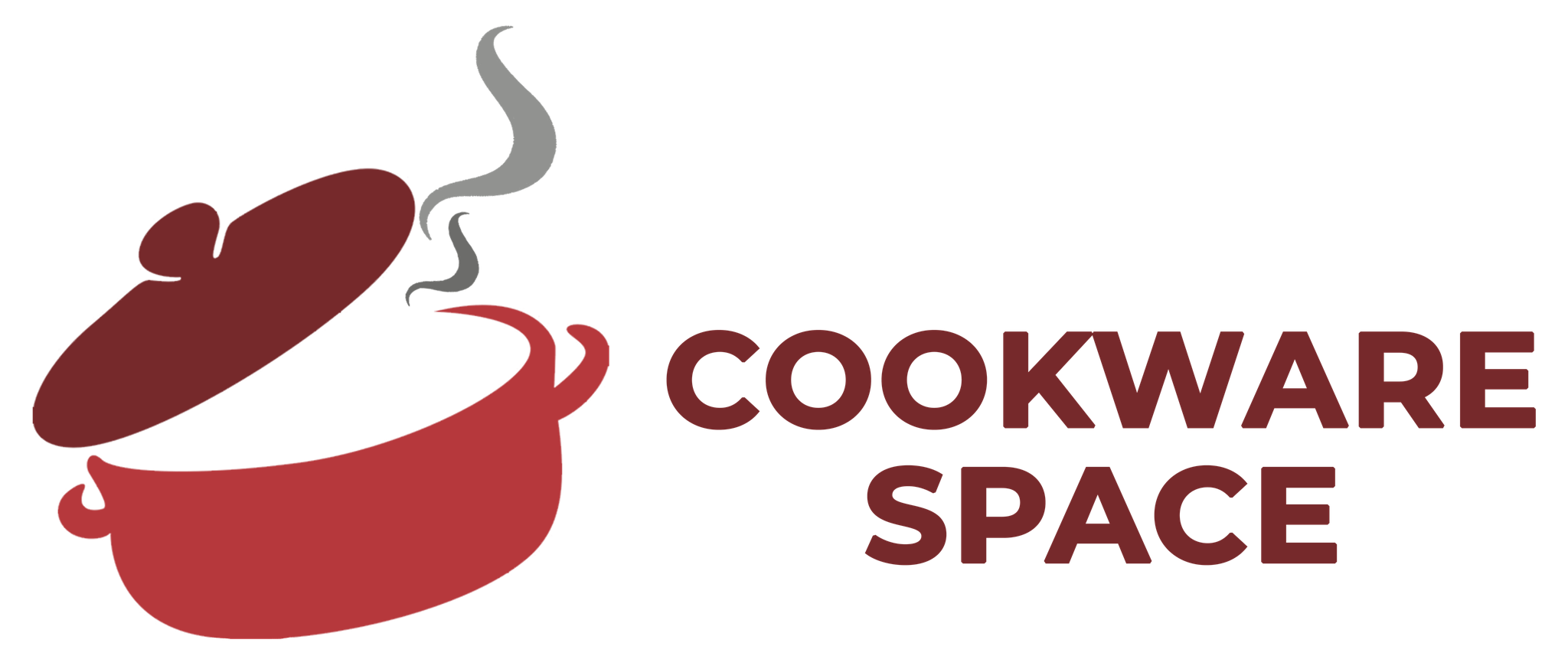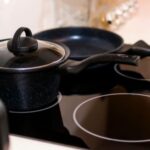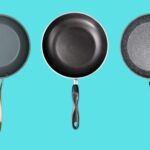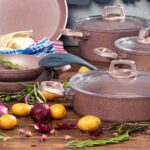11 Pros and Cons of Enameled cast iron cookware
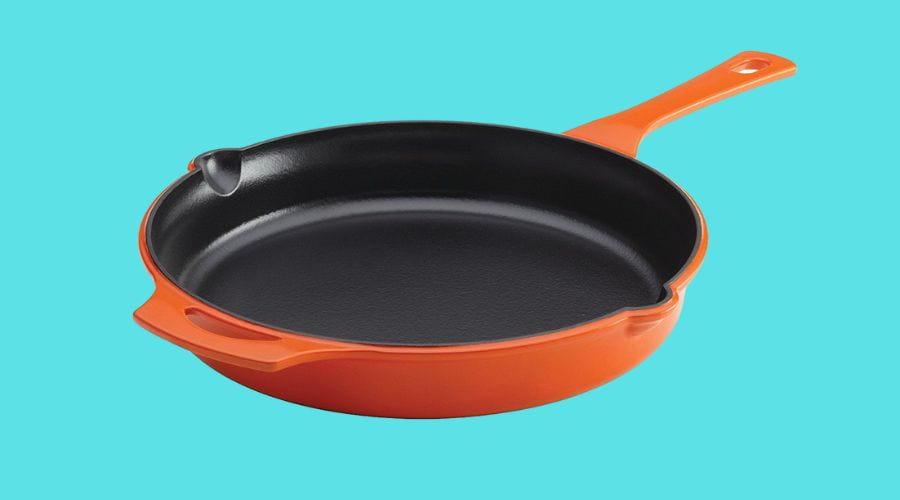
Enameled cast iron is a type of cast iron that has been coated with a layer of enamel. This enamel layer helps to protect the metal from corrosion and rust, and it also gives the cookware a smooth surface that is easy to clean.
It is known for its excellent heat retention and distribution properties, which make it a popular choice for tasks such as braising, slow cooking, and roasting.
In this article, let’s try to understand what the pros and cons of Enameled Cast Iron are but before that let’s compare it with Traditional Cast iron.
Read More: Pros and Cons of HexClad Cookware
How is it different from normal cast iron?
Normal cast iron cookware is made of solid cast iron and does not have an enameled surface. It is known for its excellent heat retention and distribution properties, as well as its durability and versatility.
However, it does have some drawbacks compared to enameled cast iron cookware:
- Seasoning: Normal cast iron cookware must be seasoned before use in order to create a non-stick surface. This involves coating the cookware with a thin layer of oil and heating it until the oil polymerizes, creating a protective layer. Seasoning must be repeated regularly in order to maintain the non-stick surface of the cookware.
- Staining: Normal cast iron cookware can easily stain if it is not properly cared for. Foods with high acidity levels, such as tomatoes or citrus, can cause the cookware to take on a metallic taste if they are cooked in the pan for an extended period of time.
- Rusting: Normal cast iron cookware is prone to rusting if it is not properly dried after washing. It is important to dry the cookware thoroughly and to store it in a dry place to prevent rust from forming.
- Weight: Normal cast iron cookware is very heavy, which can make it difficult to handle and may not be suitable for those with limited strength or mobility.
Enameled cast iron cookware, on the other hand, does not require seasoning and is less prone to staining and rusting. It is also lighter in weight than normal cast iron cookware, which makes it easier to handle.
However, it is more expensive than normal cast iron and is more prone to chipping if it is subjected to heavy use or if it is dropped or knocked against hard surfaces.
Pros and Cons of Enameled Cast Iron
Pros of Enameled Cast Iron
1. Easy to clean
The first and foremost advantage of enameled cast iron is that it is very easy to clean. Compared to the traditional cast iron cookware, you will not need to put in extra effort to clean this one. All you need to do is use a mild soap and water solution and scrub it lightly with a sponge.
2. Doesn’t require seasoning
Another significant advantage of enameled cast iron is that it doesn’t require seasoning. Seasoning refers to the process of applying a layer of oil or fat on the cookware so that it doesn’t get rusty. With enameled cast iron, you don’t need to worry about this as it comes with a non-stick enamel coating.
Read More: Do You Need to Season Enameled Cast Iron
3. Enameled cast iron doesn’t rust
Another major advantage of enameled cast iron is that it doesn’t rust. This is because the enamel coating creates a barrier between the metal and the moisture, thus preventing rusting.
4. Non-reactive
The main issue with normal cast iron and carbon steel cookware is that they are reactive. This means that they can react with acidic foods and leave a metallic taste. However, this is not the case with enameled cast iron as it is non-reactive. This means that it won’t react with acidic food items such as tomatoes and vinegar.
5. Offers different colors
Enameled cast iron is also available in a variety of colors, which makes it a great option if you are looking to add a pop of color to your kitchen. This is something that you won’t find with traditional cast iron cookware.
6. Induction friendly
If you have an induction cooktop, then you will be happy to know that enameled cast iron is induction friendly. Because cast iron is a magnetic material, it can be used on induction cooktops.
7. Good heat retention
Another advantage of enameled cast iron is that it has good heat retention. This means that it will retain the heat for a longer period of time, which is ideal if you are looking to cook slow-cooked meals.
8. Safely use on Glass top Stove
When it comes to using normal cast iron on glass top stoves, there is always the risk of scratching the surface. However, this is not the case with enameled cast iron as it has a smooth surface. Thus, you can safely use it on your glass top stove without worrying about scratches.
9. Even heating
Enameled cast iron cookware heats up slowly and evenly, which helps to reduce hot spots and prevents food from burning or sticking.
Cons of Enameled Cast Iron
1. Expensive
One of the main disadvantages of enameled cast iron is that it is relatively expensive compared to traditional cast iron cookware. This is because it goes through a special enameling process, which adds to the overall cost.
2. Heavy
Enameled cast iron is also quite heavy, which can make it difficult to handle. So, if you are not used to handling heavy cookware, then this might be an issue for you.
4. Not Metal Utensils Safe
Another disadvantage of enameled cast iron is that it is not metal utensils safe. This means that you cannot use metal spatulas as they can damage the enamel coating.
Enameled Cast Iron vs Non-Stick
Now let’s compare enameled cast iron with non-stick cookware.
When it comes to price, enameled cast iron is more expensive than non-stick cookware. However, it is important to note that enameled cast iron is a lot more durable than non-stick cookware. So, in the long run, it will actually be a lot cheaper as you won’t have to replace it as often.
When comparing Cast Iron with Teflon or any other non-stick cookware, the big advantage that cast iron has is that it can be used at higher temperatures. This means that you can use it for searing and browning meats. However, non-stick cookware is not suitable for these purposes as the high heat will damage the coating.
When comparing Cast iron with Ceramic Cookware, the big advantage that cast iron has is that it is more durable. And if we talk about lifespan, then cast iron can last for decades if properly cared for. On the other hand, ceramic cookware has a shorter lifespan as it is more prone to chipping and cracking.
So, if you are looking for durability and longevity, then enameled cast iron is the way to go. However, if you are looking for something that is cheaper and lighter, then non-stick cookware would be a better option.
Enameled cast iron is also induction friendly, which means that it can be used on induction cooktops. However, non-stick cookware is not suitable for induction cooking as the high heat will damage the coating.
So, if you have an induction cooktop, then you should definitely go for enameled cast iron cookware.
If we compare Nonstick with Enameled Cast iron in terms of heat distribution, then nonstick cookware is better as it distributes heat evenly. However, cast iron does have good heat retention properties, which means that it will retain the heat for a longer period of time.
Lastly, Enameled Cast Iron Heats Slowly as compared to Nonstick cookware. Most of the nonstick pans are made of Aluminum which is a good conductor of heat.
FAQs
Is enamel cookware toxic?
No, enamel cookware is not toxic. The enamel coating is made of glass, which is a non-toxic material. However, if the enamel coating chips, then the metal underneath can rust and leach into food.
But that doesn’t mean it is toxic because iron is an essential nutrient. So if you eat food that has been cooked in enamel cookware, you’re not going to get sick from the cookware itself.
How do I clean enamel cookware?
Enamel cookware is easy to clean. Just use warm soapy water and a soft sponge. If there are any stubborn stains, you can use a non-abrasive cleanser. Don’t use anything harsh like steel wool or scouring pads, because that will damage the enamel coating.
How do I season enamel cookware?
You don’t need to season enamel cookware. The enamel coating is non-stick, so food won’t stick to it. However, if you want to add some extra flavor to your food, you can season the cookware before cooking. Just rub some oil on the surface of the cookware and then heat it up. This will create a barrier that will help to keep food from sticking.
Can I put enamel cookware in the oven?
Yes, you can put enamel cookware in the oven.
Can I put enamel cookware on the stove?
Yes, you can put enamel cookware on the stove.
Can I put enamel cookware in the dishwasher?
Yes, you can put enamel cookware in the dishwasher. The enamel coating is dishwasher safe. However, the best practice is to hand wash enamel cookware to prevent the enamel from chipping.
Can I use metal utensils on enamel cookware?
Yes, you can use metal utensils on enamel cookware. However, avoid using sharp or pointed utensils as they can scratch the enamel coating.
